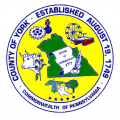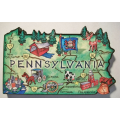For our 2024 rankings, the research team at Nursing Schools Almanac collected data on nearly 3,000 nursing schools and campuses throughout the United States. We evaluated each school on three dimensions:
Pennsylvania
We've organized a comprehensive list of Pennsylvania nursing schools. Below you'll find information on specific nursing programs such as LPN certificates and ADN, BSN, and MSN degrees. You'll also find a profile of nursing education and careers in each major Pennsylvania city.
Pennsylvania nursing programs and careers
City-specific information
In York, Pennsylvania, and throughout most of the country, there are three different occupations within the nursing field: certified nursing assistant (CNA), licensed practical nurse (LPN), and registered nurse (RN). Below we profile each nursing role in depth.
Certified nursing assistant
The Scranton / Wilkes-Barre area is home to several educational institutions that can provide the training, experience, and opportunities needed for a successful nursing career. If you are considering a career in nursing, you should carefully consider your time commitments, finances, personal aspirations, and professional goals in order to select the best educational program. There are three types of programs that can lead to a satisfying career in the nursing field.
Certified nursing assistant
Individuals pursuing a nursing career can find several quality schools in Reading, Pennsylvania. Reading Area Community College, Reading Hospital School of Health Sciences, and Alvernia College are three local institutions that provide well-regarded training. Upon completing a degree or certificate program, graduates can work at local healthcare employers like Reading Hospital, Haven Behavioral Hospital, and the Women’s Center.
A master of science in nursing (MSN) program enables a registered nurse (RN) with a bachelor’s degree to enter a specialized practice field like nurse anesthetist, nurse midwife, or nursed practitioner. MSN degrees are offered at roughly 40 colleges and universities throughout the state of Pennsylvania, including prestigious institutions like York College of Pennsylvania, University of Scranton, and University of Pennsylvania.
The financial cost of attending nursing school in Pennsylvania includes several elements. Aside from annual tuition fees, students must budget the cost of books and supplies for the academic year. Room and board should also be taken into consideration for students living on campus. Finally, nurses will take a state-administered examination upon graduation that requires a nominal fee.
Private colleges and universities are funded primarily by tuition, investments, and private donors. These stand in contrast to public institutions, which are primarily funded by taxpayers. Approximately 20% of American college students attend private colleges, which include both non-profit and for-profit entities. Private universities tend to be more prestigious than their public counterparts, and most private schools have smaller class sizes due to their stricter selection criteria.
Public colleges and universities are educational institutions primarily funded by the federal, state, and local governments. These stand in contrast to private universities, which rely more heavily upon student tuition and endowments. The quality of education provided by public universities has steadily increased over the years; many are now just as prestigious as their private counterparts. Public universities are often widely accessible to students who live in-state (or in-county), and these students enjoy lower tuition fees than private university enrollees.
Over 8,000 nurses are employed in Lancaster, Pennsylvania. These nurses fulfill three distinct healthcare roles depending upon their level of training: certified nursing assistant (CNA), licensed practical nurse (LPN), and registered nurse (RN). Once they receive official licensure, newly minted nurses in Lancaster can seek employment with major local healthcare providers like Genesis Healthcare.
Certified nursing assistant
Nurses are crucial to any healthcare institution and often in high demand across the nation. Prospective nurses can choose from several distinct education pathways. A number of colleges in Harrisburg, Pennsylvania, offer the requisite programs for prospective nurses, including Harrisburg Area Community College and Widener University.
There are three different nursing roles that prospective nurses can pursue: certified nursing assistant (CNA), licensed practical nurse (LPN), or registered nurse (RN). Each role has distinct responsibilities, educational requirements, and compensation. All roles are employed heavily by the major healthcare employers in Erie, Pennsylvania, including Sunrise Senior Living and the US Department of Veterans Affairs.















